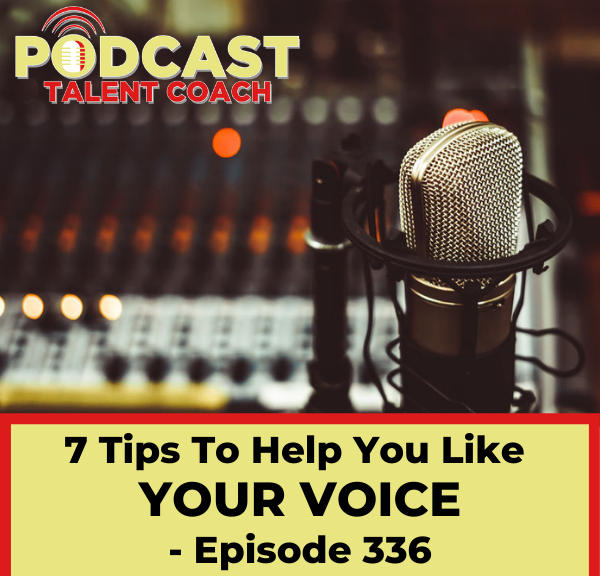Podcast: Play in new window | Download
Subscribe: RSS
Most people do not like the sound of their own voice. It is natural and quite common. Don’t let it get in your way.
When we hear ourselves, the Impostor Syndrome starts to kick in.
On a coaching call the other night, we were talking about reviewing your podcast in order to improve. The only way to improve your content is to listen to your shows like a listener.
My client said she finds it difficult to listen to her podcast. She said it is uncomfortable.
NATURAL
It is quite natural to dislike the sound of your own voice when hearing a recorded version of it. When you talk, the bones in your head vibrate adding to the timbrance and qualities you naturally hear.
When you hear a recording of your voice, those vibrations are absent. The bones in your head aren’t vibrating. That causes your voice to sound different to you.
The natural bone vibrations also make your voice bounce up and down like a cheesy DJ. You start doing some unnecessary acrobatics with your voice when you are wearing headphones.
The bone vibrations combined with the enclosed nature of your headphones cause you to hear the big announcer voice. It is much different than the way your listener hears it. You tend to speak in ways you don’t normally speak in everyday conversation when you are wearing headphones.
FEAR
As we listen to ourselves, we think about being judged. It is said that the most common fear is the fear of public speaking. The thing we fear most is not speaking but humiliation. We don’t want to make fools of ourselves.
Your inner critic never congratulates you. Your voice reminds you of the critics.
The more you listen to your show, the more comfortable you will be with your voice.
There are seven steps you can take to make your voice sound more natural and get you on the path to enjoying the sound of your voice.
1. NOTES
The way you write is much different than the way you speak. You use different words. Your sentence structure is different. The flow of the written word simply differs greatly from the spoken word.
As you are speaking, use notes instead of a full script. You will sound much more comfortable when speaking from the heart rather than speaking from the script. The flow and structure of your sentences will be much more natural.
Make note of the important points to include in your podcast. Hit those points within your show without reading it word for word.
2. ONE PERSON
You will sound much more natural when you speak to one person rather than a group of people. Audio is a very personal medium. People are using listening with headphones.
The only reason people listen to audio is for companionship. They don’t want to be alone when they are doing whatever it is they are doing. Talk to her.
When your listener is listening to your podcast, she wants to feel like you are talking to directly with her. If you include a call-to-action in your podcast, you want your listener to act upon that request. If you are talking to a group of people, she can easily think someone else will take action and she will do nothing.
Instead, speak right to her. If you are speaking directly with her, she will begin to develop a friendship with you. She will begin to feel like she knows you. She will also feel like you care about her personally.
When you speak to one person, your delivery will sound much more conversational and less like a lecture. This will help you become more comfortable with your own voice.
3. ONE CUP
Your voice will sound different to you when you listen to your voice through headphones. The enclosed space of the headphones amplifies your voice.
The sound of your voice is also changed by the audio processing. The bones in your head vibrate differently when using headphones.
To help you sound more natural, remove one ear of your headphones. Only use one side to monitor what’s going on with the audio.
With only one cup on your ear, you are able to hear your voice more naturally with the free ear. You will also hear your voice in the context of the ambient room noise rather than through the vacuum of the headphones.
4. TURN IT DOWN
If you are wearing only one cup of your headphones, turning the volume down will also help you sound more natural. With a lower headphone volume, you will hear your natural voice better. You won’t be fooled by the dominance of the headphone sound.
Use should your headphones to make sure you hear the other audio included in your podcast. Make sure you can hear your music bed, intro, guest and other audio. However, make sure your headphones are not giving you a false image of your voice.
5. SING-SONGY
Speak naturally. Do not attempt to sound like other announcers you have heard. Be yourself.
Have you heard those old school DJs that are really sing-songy? They sound like they are puking or singing some bad, over-inflected high school musical? That’s what we don’t want.
When you speak like an announcer, you begin to stretch and emphasize words unnaturally. Your speech begins to unnaturally bounce.
When you listen to your recorded voice like this, you sound like a puky disc jockey or used car salesman on a bad television commercial. Both lack warmth. They are hard to believe.
Instead, speak conversationally. Use a natural pace. Don’t use unnecessary emphasis on words. It might help if you speak like you are on the telephone just talking with one person on the other end. These steps will help your voice sound more natural.
6. PERFORM
This may sound counter to what I just said, but you need to perform.
Put yourself in the right frame of mind with visions. People can hear your smile. You need to get there before the recording begins.
Work from pictures. All communication is visual. Envision in your mind a specific time and place that makes you happy. Actually describe it out loud. This will change your state of mind.
There is a philosophy in acting that the performance begins before you break the wings. That means actors get into character before they actually step onto stage. They take steps to get in the right frame of mind before the performance begins.
Do the same for your podcast. Get there before you hit record.
7. REVIEW
The best way to become a more natural speaker is to review your show often.
When you listen to your show on a regular basis, you will become much more accustomed to hearing your voice in a recorded setting. You dislike your voice, because you are not used to hearing it outside of your own head. The more you hear your voice, the more natural it will sound.
It is possible to overcome the dislike of your own voice. You simply have to take steps to conquer it. It will take time to begin liking the sound of your voice. Be patient.
Remove some of the annoying qualities of your speech. Use notes, speak to one person and get rid of the sing-songy pattern. Polish up the product first.
Next, adjust the way your record. Use only one cup of your headphones. Turn the volume down a bit to hear your voice in its natural setting. Make minor adjustments until you get comfortable.
Finally, review your show. When listening to your own voice becomes habit, your recorded voice will sound much more natural to you. Review your show often.
If you don’t have a mentor who can take your hand and walk you every step of the way, go to www.PodcastTalentCoach.com/apply, click the button and apply to have a chat with me. We will develop your plan and see how I can help and support you to achieve your podcast goals.


